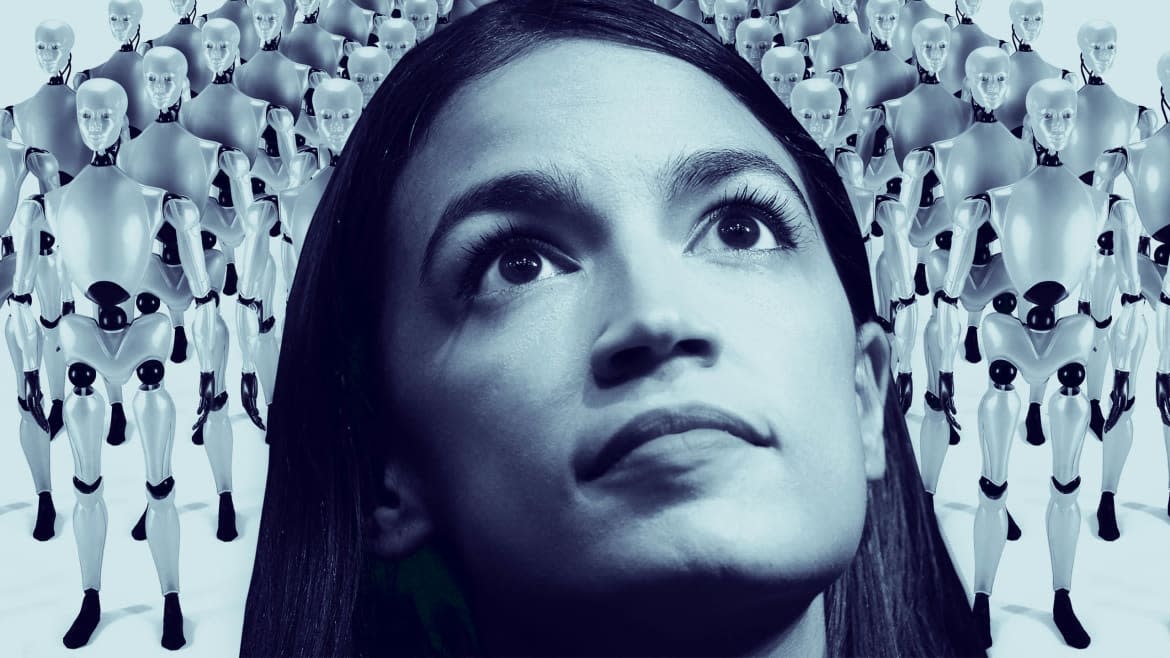Alexandria Ocasio-Cortez Says She Can See Automation Liberating Americans. Don’t Bet on It.

The headlines are dizzying now, these glimpses of competing futures in which “Automation could destroy millions of jobs” or which explain “Why AI will create jobs," as we try to work whether people will be liberated or discarded in a high-tech future.
People who work in tech, too, are wrestling with these competing visions of the future and its utopian or apocalyptic robots. In a poll of nearly 2,000 “experts,” Pew Research found a virtual tie, with 48 percent envisioning “a future in which robots and digital agents have displaced significant numbers of both blue- and white-collar workers”—and many expressing concern that this will “lead to vast increases in income inequality, masses of people who are effectively unemployable, and breakdowns in the social order.”
But the other half (52 percent) “expect that technology will not displace more jobs than it creates by 2025.” This latter group has “faith that human ingenuity will create new jobs, industries, and ways to make a living, just as it has been doing since the dawn of the Industrial Revolution.”
Recently Rep. Alexandria Ocasio-Cortez, one of the most prominent figures in the Democratic Party, weighed in with remarks that garnered a great deal of attention.
“We should be excited about automation, because what it could potentially mean is more time educating ourselves, more time creating art, more time investing in and investigating the sciences, more time focused on invention, more time going to space, more time enjoying the world that we live in,” Ocasio-Cortez said, putting the anti-1-percenter firmly on the side of the optimistic 52 percent of technologists.
But something else she said got less attention, and spoke more to the pressing issue: The “reason we’re not excited by it is because we live in a society where if you don’t have a job, you are left to die. And that is, at its core, our problem.”
Working in this space full-time at a company that helps people find stable supplemental sources of income, these questions aren’t about future prophecies—they’re about realities already underway. And, unfortunately, I see a bleaker picture forming.
Automation is already displacing some work. As presidential candidate Andrew Yang wrote in The Daily Beast, “reports of low unemployment are incredibly misleading” given the substantial decline in the labor participation rate. A study from professors at MIT and Boston University found that, on the low end, each robot now replaces around three workers—but the impact is higher in certain industries such as manufacturing, electronics and chemicals.
But the question of how many jobs will exist misses the bigger one: How much work will each “job” entail, and for how much pay?
Millions of people are currently unable to cobble together enough work hours to make a living, with more than 4 million now working part-time because that’s all they can get, the latest government data shows. Even among people classified as working full-time, 30 percent have taken on an extra job for pay.
Thirty-six percent of workers already have a gig-work arrangement, Gallup reports. Most of these people, with contingent or alternative work arrangements, have little to no stability and no safety net.
It is true that, in the long run, new technologies create new jobs. But that can happen after a long period of time. And with the threat of a recession looming, the potential combination of layoffs and automation could create devastating conditions for an extended time.
The vision AOC describes—to have more time to do things other than work—is a nice idea. But it could only really flourish in smaller countries, like some Nordic ones with high taxation and very different economic and social structures. A basic underpinning of the U.S. economy is the recruitment of corporations from all over the world, which also helps keep the U.S. dollar as the world’s reserve currency. All this limits how high corporate taxes could go—which, in turn limits how much public funding there would be to support people as they engage in these other activities.
To prepare for the dangers ahead, we need to revolutionize worker protections in numerous ways: unemployment coverage for gig workers; guaranteed schedules at least two weeks in advance so people can plan multiple part-time gigs and handle responsibilities such as child care; national living wages, portable benefits with affordable health care and more.
On much of this, I find common ground with AOC and other progressive politicians. To lawmakers across the ideological spectrum at all levels of government, you need to see the urgency of shaping a future that’s already here for many of us. If you don’t act now, your constituents will suffer. Many already are.
Yes, worry about automation. And take swift action to force it into an economy that benefits people.
Adam Roseman is co-founder and CEO of Steady, an Atlanta-based startup that assists workers and job seekers in creating a stable monthly income and a more solid financial future.

